- Home
- Jennifer Moore
Spring in Hyde Park
Spring in Hyde Park Read online
Copyright © 2016 Mirror Press
E-book edition
All rights reserved
No part of this book may be reproduced in any form whatsoever without prior written permission of the publisher, except in the case of brief passages embodied in critical reviews and articles. These novels are works of fiction. The characters, names, incidents, places, and dialog are products of the authors’ imaginations and are not to be construed as real.
Interior Design by Heather Justesen
Edited by Donna Hatch, Jennie Stevens, and Lisa Shepherd
Cover design by Rachael Anderson
Cover Photo Credit: Laura Blost/Trevillion Images
Published by Mirror Press, LLC
eISBN-10: 1941145493
eISBN-13: 978-1-941145-49-4
Autumn Masquerade
A Midwinter Ball
Summer House Party
A Country Christmas
A Happy Accident by Jennifer Moore
Other Works by Jennifer Moore
About Jennifer Moore
The Disdainful Duke by G.G. Vandagriff
Other Works by G.G. Vandagriff
About G.G. Vandagriff
The Invisible Heiress by Nichole Van
Other Works by Nichole Van
About Nichole Van
Chapter One
London, 1813
Jonathan Burles, Earl of Rensfield, flinched at the sound of thunder and pulled back on the reins to keep his nervous horse in check. He craned his neck to glance up from under the canopy of his curricle, even though the sky was too dark at this time of night to see anything but black. When the torrent of rain began, he uttered a word that would have made the roughest sailor raise a brow. The rumbling had sounded far off when he’d called for his carriage at White’s twenty minutes earlier, but had moved much faster than he would have thought possible.
“Blast London in the cold,” he muttered, wishing there were a way to pull his Hessians beneath the carriage’s cover. The boots were newly made by George Hoby, the Prince’s own bootmaker, and this icy rain would surely ruin the fine leather.
The weather was not the only reason for his dark mood. His father’s failing health had put more responsibility upon his own shoulders, necessitating an early visit to his solicitor’s office in London. When the need was presented, Jonathan was eager to both please his father and escape the critical attention of his sisters, but the city was quite different this time of year. Now he knew why the ton avoided London out of Season. The weather was unbelievably cold, and the grand houses eerily empty. Without society to occupy his attention, he’d become uncomfortably aware of less than savory characters on street corners, and the alleyways between shops looked even more dark and menacing.
Only a few more days, he reminded himself. Once this business is concluded, I shall be off to Northampton for a few more weeks before I can return with my parents and Archie.
He felt a rush of anticipation at the thought of reporting the outcome of his meetings when he returned to the country estate. Over the next few years, his investments should nearly double the family’s holdings. The solicitor had been impressed with his business strategy, and Jonathan was certain his father could not help but be proud as well.
Though nobody said it aloud, his father’s health was not improving. Jonathan would likely be the marquess within a year, and according to the women in his family, that meant he needed a wife. The thought of their attempts to throw young ladies they deemed acceptable into his path at every opportunity made him ill. The last thing he wanted was for this important choice to be made for him by people who so obviously did not care a bit for his opinion on the matter.
A surge of lightning lit the street, and the horse startled, jerking the conveyance toward the curb. At the accompanying sound of thunder, the animal skittered to the side. A branch scraped the top of the curricle’s canopy, showering a curtain of water onto Jonathan’s legs. He cursed and turned the horse off the cobblestone street onto the muddy path that led through Kensington Gardens in the very southwest corner of Hyde Park, choosing the shorter route over the lit and paved roads. His groom would be none too happy when he saw the state of the wheels, but the tree-lined route through the park would save nearly fifteen minutes, and that was a quarter of an hour less that Jonathan would be driving a skittish horse through a thunderstorm while sitting in wet trousers.
The park’s pathways were shadowed, with the streetlamps much farther apart than those on the London roads, but he could see the way well enough with the lantern hanging from the carriage’s canopy, and he’d traveled this route often enough.
A gust of wind blew a wet spray into his face. What was the point of the blasted canopy if he was going to end up soaked anyway? He called over the noise of the storm to his horse, flicking the crop to speed the animal along.
Ahead, he spotted a glow that seemed too low to be a streetlamp. The light moved. Just as he squinted to look closer, another bolt of lightning lit the sky, revealing a carriage on an adjoining path. In the momentary glimpse, he’d seen that the carriage leaned at an odd angle, perhaps as a result of a broken wheel or axle. Two people stood next to the carriage: a man holding a lantern and a woman with an umbrella. As a gentleman, he could not continue without volunteering assistance, although he did reach beneath the bench and take hold of a pistol. Stories of bandits waylaying lone travelers were all too common, and though the scene looked innocent, he wouldn’t risk being taken by surprise.
A boom of thunder crashed overhead.
The passengers still had not seen him approach.
“Hello there,” he called as he rode near.
The woman whirled, her eyes wide, and she took a step back. Her gaze darted from her companion to Jonathan. The man, who was dressed in the livery of a servant, stepped in front of her, his hand on a pistol in his waistband.
Jonathan laid his own weapon on the curricle bench and held up his hands, yelling to be heard over the storm. “Do not fear. I saw that your carriage is out of commission.”
“Stuck in the mud . . .” The driver jerked his thumb over his shoulder. “. . . my lord,” he added, looking closer. Rain plastered his stringy hair to his head and dripped from his face.
“I see.” Jonathan lifted his own lantern from its hook and stepped out of the carriage, grimacing as his boots sank into the sticky muck. He held up his arm to block the rain pelting his face. “Then perhaps I might be of assistance.”
The woman took a step from behind the servant, and Jonathan raised the lantern to get a better look.
In the glow of the firelight, he could see her cape was well-designed, but not the latest in fashion. And the carriage, while not a hired hackney, had seen a fair bit of use. She was not a noblewoman, then, but certainly a gentleman’s daughter. Where is her traveling companion?
The wind tugged the umbrella, pulling it away and stretching her arm nearly straight. She gasped as a blast of wet air hit her face.
Jonathan moved quickly, grasping the handle that had nearly been tugged from her grip, and held it over her head. He stood with her beneath the umbrella, so close that she tipped back her head to look up at him.
“Forgive me for presuming an introduction, miss.” He spoke with his chin nearly touching his chest to look down at the woman.
“I think in such circumstances, a breach of etiquette can be forgiven.” Her lips lifted in a smile.
Even in the dim lantern light, he could see her eyes were a mossy green color. They were large, nearly too large for her face, but the effect was breathtaking, and he held her gaze, perhaps a bit too long. Especially for their close quarters.
“Mi
ss Maryann Croft.” Her voice broke the spell of her gaze.
“Enchanted,” he murmured, and remembering himself, cleared his throat. “Jonathan Burles, Lord Rensfield.” He meant to tip his head in a bow, but his neck was already bent as far forward as his collar would allow.
“A pleasure, my lord.” She dipped in a curtsy that, from his view, appeared as though the top of her bonnet sank down into the darkness and then returned.
Another howl of wind blasted a shower of rain over them. Miss Croft covered her face, and Jonathan was once again aware of the storm, the mud, and the waiting servant. He raised the lantern and returned the umbrella to Miss Croft, grimacing at the shower of rain when he stepped from beneath it. “Shall we have a look at the carriage?”
The servant had apparently been waiting for this very question and hurried to pull the horses forward. As the animals strained, Jonathan watched the wheels, which didn’t budge in the least. He moved to the rear of the conveyance to push. Though the animals pulled and Jonathan shoved, the carriage just slipped and sank farther, as did the earl.
Finally, he called for the servant to halt. He motioned the man toward him. “There’s no help for this tonight,” he yelled over the howling wind, lifting his feet from the thick mud. “Come, miss, I will deliver you home.”
Miss Croft’s brow furrowed, as she looked at him, then to the driver. Jonathan wondered what she could possibly be thinking. Was she considering walking? Did riding with a stranger make her nervous?
Another burst of lightning, followed directly by a crash of thunder, sent the horses into a panic. Both Jonathan and the carriage driver hurried to calm their animals.
“Best do as he says, miss,” the servant yelled.
Miss Croft pulled her cape closer around, and Jonathan saw she was shivering. But she still hesitated. She glanced up the road in the direction the carriage was heading.
Jonathan did not give her an opportunity to argue. He stepped back through the sticky mud and took Miss Croft’s arm. He led her to his curricle, handed her in, and sat beside her. But when he flicked the reins and the horse took a step, the conveyance did not move. He stepped back down, looked beneath the wheels, and was dismayed to see they’d sunk into the mud as well. Even with the servant’s help, he realized quickly that his carriage would not be moving tonight either. He uttered a curse that was thankfully carried away on the wind before Miss Croft overheard. He’d thought his lightweight carriage would fare better than the sturdier counterpart.
He gritted his teeth and hesitated, unsure of how to handle the situation. What was proper? They could not all go for help. One of the men would need to remain with the lady. If he remained with her without a chaperone, she might be considered compromised, but under the circumstances, it seemed the logical option.
The whipping wind made cold raindrops sting his skin. He pushed aside his worries. If anyone should wait in the carriage, it was he. He was Lord Rensfield, for heaven’s sake—the nobleman and therefore the responsible party. They’d dallied long enough, and it was time to take control. “You there,” he yelled, pointing to the servant. “Take the horses to your master’s house and bring help. I will remain with Miss Croft until your return.” The servant should return within the hour, he reasoned.
He did not wait for an argument. Holding on to Miss Croft’s elbow, he led her to the tilting carriage that would offer more protection than his open-air curricle and pulled open the door, bracing himself as the wind nearly tore the panel from his hands.
The servant looked back and forth for a moment and then hurried to the horses, leaving Jonathan to assist the young lady into the leaning carriage.
He released the door, which slammed shut behind her. With the wind whipping around him and the rain soaking him through, he unfastened the curricle’s harness and led his nervous horse to the driver.
Once the man had disengaged the two carriage horses, he mounted one and held the reins of the others, leading them from the path, through the park.
Jonathan returned to the carriage and forced the door open again, setting the lantern on the floorboards. It slid across the tilting floor toward Miss Croft, and she stopped it with her foot. Jonathan saw that her boots and the bottom of her cape and gown were caked with mud. The rest of her was soaked. She’d removed her bonnet, and her dripping hair was plastered to her head and face. He assumed he looked much the same.
As he climbed in, none too gracefully, the conveyance sank farther toward the rear. He sat on the bench facing her and braced his feet against the opposite bench to keep himself from sliding forward as the carriage tilted toward the back.
“Do you mind, miss?” he indicated the empty spot on the bench next to her. At this point, he figured social graces were the last thing on either of their minds.
“Of course not.” She slid toward the opposite door.
“Much better.” He turned and lowered himself onto the bench, leaning back slightly with the incline of the carriage.
A bright burst of lightning and a thunderclap came nearly at the same time, and Miss Croft’s brow furrowed again. She glanced toward the door handle. The look of worry on her face was endearing, and he had the strange impulse to comfort her. Perhaps his emotion stemmed from the fact that she was very small, very beautiful, and wrung her hands nervously.
“Do not fear the storm. We are quite safe in here.”
She turned her face toward him. Small droplets still clung to her lashes, and in the lantern light, they shimmered. “I am not afraid. I simply wish . . .”
“Help is on the way, and you will be home and dry before you know it.” He hoped his tone was soothing.
Miss Croft’s expression did not relax, and he thought of how he might assuage her fears. He himself had been afraid of thunderstorms as a child and thought if he kept her talking, she might be distracted from her worry.
“If you don’t mind my asking, where do you live, Miss Croft?”
She shivered and pulled her cloak tighter around her shoulders, and he wished he had something dry to give her. “Ashford. But while we are in London, my father has taken a home in Knightsbridge.”
“Not far, then. The servant should return within a short time.” He looked at her, cocking a brow. Her carriage was heading in the opposite direction. And Knightsbridge was quite near. Had she started off from home after the storm began? “And where was a young lady going alone at such a late hour in this weather?”
She turned her face to glance out the window, and a wet curl fell against her cheek. She ran her hands over a bundle in her lap that he hadn’t noticed before and gave him a small smile. “A lady must have some secrets, my lord.”
Jonathan could not prevent his brows from rising. Was she meeting a man? Miss Croft did not seem like the sort of young lady to involve herself in a liaison. But what else could it be? And what did he know about the sort of young lady she was? Just because she appeared sweet and lovely did not mean she was incapable of indiscretion. His stomach heated with something very near jealousy, and he wished he did not find her so very attractive.
A loud crack sounded nearby, as though the wind had broken a tree branch. The wind shook the carriage, and something banged against it.
Miss Croft jumped, drawing in a quick breath and spilling the bundle, which turned out to be some sort of pouch from her lap.
He scooped up the book that had fallen from the pouch. “Homer’s Iliad? I see. Not even a hurricane could prevent you from returning this borrowed book.”
Miss Croft’s face was tense, her gaze on the book, but at his words, and more likely his teasing tone, her expression relaxed, and a smile pulled at the corner of her lips. “Yes, I am a very responsible patron of the lending library.”
Her smile made his pulse jump. The second unexpected reaction this evening. “I can see that.”
“Actually, it is my sister’s book. And if I am remembering correctly, you have sisters as well, don’t you, my lord?”
“Yes. And sometim
es I wish I found it a bit more difficult to remember the fact.” He pulled his lips in a wry grin to show that his comment was meant to be a jest, but the truth of the matter was, at times, his elder sisters could be suffocating. And by “at times,” he meant at all times. Jonathan’s mother was The Marquess of Spencer’s second wife, and Jonathan was much younger than his half sisters, which meant he was perpetually treated like a child. Though he was the only son and heir, when it came to his sisters, his opinion was rarely taken into account, even though he was nearly six and twenty years old, educated at Oxford, and a member of Parliament in the House of Commons. He sat on important government committees, was well respected as Lord Rensfield to his peers and associates, but at home, he was more likely to be called “Renny,” or even worse, “Johnny Boy.” He stretched his legs out in front of him and crossed his arms. “Sometimes family can be rather overbearing. Surely you feel the same at times about your sister.”
An expression crossed over her eyes for a moment, and Jonathan realized his comment bothered her. “Jane is my dearest friend.” Her voice was soft, and she pulled together her brows causing a wrinkle right above her nose.
Jonathan’s fingers itched to smooth it away. The thought of acting in so familiar a manner surprised him. He was becoming extremely uncomfortable with how extremely comfortable he felt with her.
“Then Jane should have talked some sense into you. Hyde Park is no place for a young lady alone at night, least of all during bad weather.”
The wrinkle deepened, and she let out a breath through her nose. “You are right, of course.” She glanced again toward the window as a particularly loud gust of wind rattled the carriage. She returned the book to its pouch and situated herself in the seat, leaning back against the cushioned headrest. She held up her hand to stifle a yawn.
“Where are you going tonight, my lord?”
He scooted down on the bench until his head was level with hers, thinking again how very pleasant the reclined seat and the cushioned headrest were. Perhaps he should consider installing leaning benches in his own carriage. He blinked against his weariness as he realized how silly his thoughts were becoming. “Home. Well, to the townhouse in Kensington. My home is actually in Northampton.”

 Charlotte's Promise
Charlotte's Promise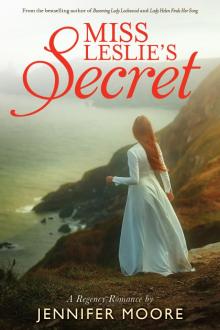 Miss Leslie's Secret
Miss Leslie's Secret My Dearest Enemy
My Dearest Enemy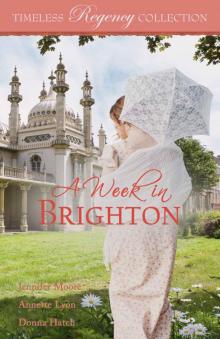 A Week in Brighton (Timeless Regency Collection Book 13)
A Week in Brighton (Timeless Regency Collection Book 13)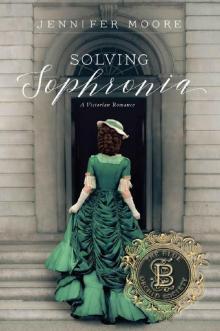 Solving Sophronia (The Blue Orchid Society, #1)
Solving Sophronia (The Blue Orchid Society, #1)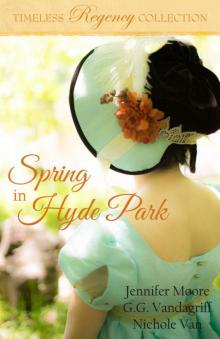 Spring in Hyde Park
Spring in Hyde Park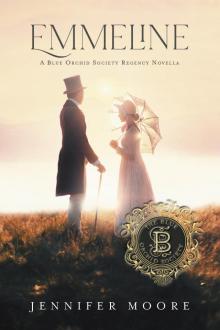 Emmeline
Emmeline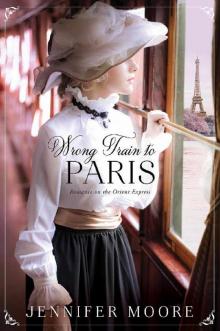 Wrong Train to Paris (Romance on the Orient Express, #2)
Wrong Train to Paris (Romance on the Orient Express, #2)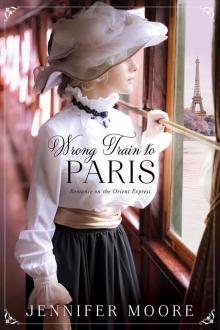 Wrong Train to Paris
Wrong Train to Paris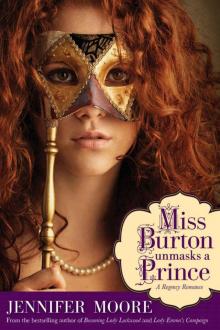 Miss Burton Unmasks a Prince
Miss Burton Unmasks a Prince Safe Harbor
Safe Harbor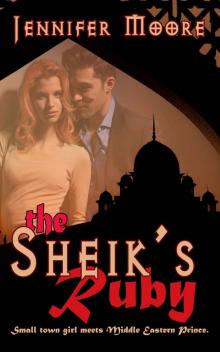 The Sheik's Ruby
The Sheik's Ruby Change of Heart
Change of Heart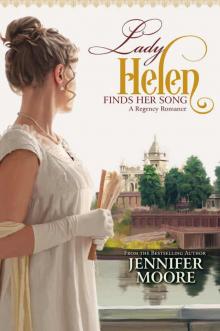 Lady Helen Finds Her Song
Lady Helen Finds Her Song Simply Anna
Simply Anna